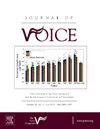Community Choir Improves Vocal Production Measures in Individuals Living with Parkinson's Disease
IF 2.5
4区 医学
Q1 AUDIOLOGY & SPEECH-LANGUAGE PATHOLOGY
引用次数: 0
Abstract
Objectives
Parkinson's disease (PD) is a neurodegenerative disease leading to motor impairments and dystonia across diverse muscle groups including vocal muscles. The vocal production challenges associated with PD have received considerably less research attention than the primary gross motor symptoms of the disease despite having a substantial effect on quality of life. Increasingly, people living with PD are discovering group singing as an asset-based approach to community building that is purported to strengthen vocal muscles and improve vocal quality.
Study design/Methods
The present study investigated the impact of community choir on vocal production in people living with PD across two sites. Prior to and immediately following a 12-week community choir at each site, vocal testing included a range of vocal-acoustic measures, including lowest and highest achievable pitch, duration of phonation, loudness, jitter, and shimmer.
Results
Results showed that group singing significantly improved some, though not all, measures of vocal production. Group singing improved lowest pitch (both groups), duration (both groups), intensity (one group), jitter (one group), and shimmer (both groups).
Conclusions
These findings support community choir as a feasible and scalable complementary approach to managing vocal production challenges associated with PD.
社区合唱团提高帕金森病患者的发声能力
目的:帕金森病(Parkinson's disease,PD)是一种神经退行性疾病,会导致包括发声肌肉在内的各种肌肉群出现运动障碍和肌张力障碍。与帕金森病的主要大运动症状相比,与帕金森病相关的发声障碍受到的研究关注要少得多,尽管它对生活质量有很大影响。越来越多的帕金森病患者发现,集体歌唱是一种基于资产的社区建设方法,据称可以增强发声肌肉并改善发声质量:本研究调查了两个地点的社区合唱团对帕金森病患者发声的影响。在每个地点进行为期 12 周的社区合唱之前和之后,声乐测试包括一系列声乐测量,包括可达到的最低和最高音高、发音持续时间、响度、抖动和颤动:结果表明,集体歌唱明显改善了部分(尽管不是全部)声乐效果。集体歌唱改善了最低音调(两组)、持续时间(两组)、音强(一组)、抖动(一组)和光泽(两组):这些研究结果支持将社区合唱团作为一种可行且可扩展的补充方法,以应对与帕金森病相关的发声难题。
本文章由计算机程序翻译,如有差异,请以英文原文为准。
求助全文
约1分钟内获得全文
求助全文
来源期刊

Journal of Voice
医学-耳鼻喉科学
CiteScore
4.00
自引率
13.60%
发文量
395
审稿时长
59 days
期刊介绍:
The Journal of Voice is widely regarded as the world''s premiere journal for voice medicine and research. This peer-reviewed publication is listed in Index Medicus and is indexed by the Institute for Scientific Information. The journal contains articles written by experts throughout the world on all topics in voice sciences, voice medicine and surgery, and speech-language pathologists'' management of voice-related problems. The journal includes clinical articles, clinical research, and laboratory research. Members of the Foundation receive the journal as a benefit of membership.
 求助内容:
求助内容: 应助结果提醒方式:
应助结果提醒方式:


